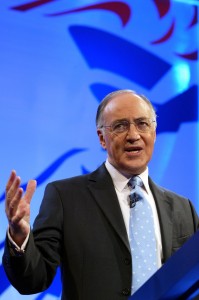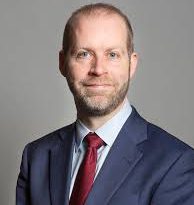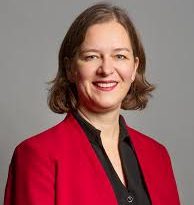Michael Howard – 2004 Speech on the Voluntary Sector and Public Services
Below is the text of the speech made by Michael Howard, the then Leader of the Opposition, at Toynbee Hall on 30 November 2004.
Since becoming Leader of the Opposition, I’ve spent a lot of time travelling round Britain. And wherever I go, I meet remarkable people who give up their time to help those who are less fortunate.
I meet people that have pulled together to tackle the problems they face. I visit communities who have been emancipated by the realisation that they can help themselves. And I see society working to meet the needs of its most vulnerable people, often more successfully than the State.
As Beveridge wrote in 1948:
“The making of a good society depends not on the State but on the citizens, acting individually or in free association with one another, acting on motives of various kinds, some selfish, some unselfish, some narrow and material, others inspired by love of man and love of God. The happiness or unhappiness of the society in which we live depends upon ourselves as citizens, not on the instrument of political power which we call the State.”
Central to my approach is a belief that voluntary organisations are often better at delivering services than government.
Just because the State pays for services, it doesn’t always have to provide them. Involving the voluntary or private sectors helps to drive up standards – benefiting everyone.
Voluntary organisations are often more flexible and more responsive than the State. They tailor their services to the communities they work in. They do not simply hand out money – they know how it’s going to be used. They rarely suffer widespread fraud – because they know their clients personally. Some of the most successful organisations in the country – the schools, care homes and child care centres catering to the poorest people in society – are independent charities.
Institutions like Toynbee Hall do not simply offer a contract with their customers. They offer a covenant: a relationship, an understanding of the emotional aspects of life, a recognition that we are not economic units or faceless statistics, but human beings.
That’s why I would like to involve the voluntary sector much more in the delivery of public services. In education, we want charitable schools to be able to compete for the money which the taxpayer spends on each child – so that parents have a greater choice of school. In health care, we want charitable hospitals and clinics to qualify for NHS funding, if they can deliver care at NHS standards and NHS prices.
But voluntary activity is more than about providing services to people in need. It’s part of a mindset, it’s a set of values, it’s a sense of humanity by which people can show responsibility for others. It’s practical. But it can also be wonderfully inspirational.
A thriving voluntary sector, by virtue of the fact that it is voluntary, is a sign of a society in which people recognise that freedom brings responsibility – responsibility not just to our communities but to those less fortunate than ourselves. It offers the decisive and positive answer to that age-old biblical question: am I my brother’s keeper?
What drives me forward is my trust in people.
I believe that if people are given a choice they will make the right decisions for themselves and their families.
I believe that if professionals – doctors, nurses and teachers – are trusted to exercise their judgment, they will take the right decisions: decisions that are in the best interests of patients and pupils.
And I believe that if the voluntary sector is trusted to help run our schools and hospitals, we can improve the services on offer.
My ambition is simple – to give everyone the choice in health and education that today only people with money can buy.
As Winston Churchill said in 1940:
“When this war is won, as it surely will be, it must be one of our aims to establish a state of society where the advantages and privileges which have hitherto been enjoyed by the few shall be far more widely shared by the many”.
It’s a dream worth turning into reality.



